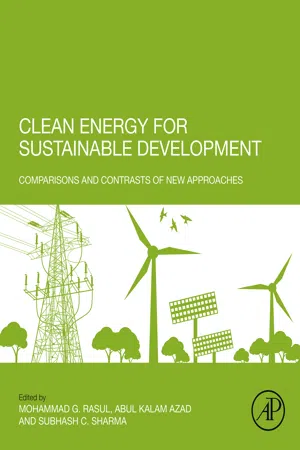
Clean Energy for Sustainable Development
Comparisons and Contrasts of New Approaches
- 630 pages
- English
- ePUB (mobile friendly)
- Available on iOS & Android
Clean Energy for Sustainable Development
Comparisons and Contrasts of New Approaches
About This Book
Clean Energy for Sustainable Development: Comparisons and Contrasts of New Approaches presents information on the fundamental challenge that the energy sector faces with regard to meeting the ever growing demand for sustainable, efficient, and cleaner energy. The book compares recent developments in the field of energy technology, clean and low emission energy, and energy efficiency and environmental sustainability for industry and academia.
Rasul, Azad and Sharma, along with their team of expert contributors, provide high-end research findings on relevant industry themes, including clean and sustainable energy sources and technologies, renewable energy technologies and their applications, biomass and biofuels for sustainable environment, energy system and efficiency improvement, solar thermal applications, and the environmental impacts of sustainable energy systems.
This book uses global institutes and case studies to explore and analyze technological advancements alongside practical applications. This approach helps readers to develop and affirm a better understanding of the relevant concepts and solutions necessary to achieve clean energy and sustainable development in both medium and large-scale industries.
- Compares in-depth research on a wide range of clean technologies, from global institutes in Australia, Europe, and India
- Evaluates the recent developments in clean technologies against the efficiency of tried and tested applications
- Considers case studies on the advancements of sustainable energy into industry from around the world
Frequently asked questions
Information
Grid Integration of Wind Energy Systems
Control Design, Stability, and Power Quality Issues
Abstract
Table of contents
- Cover image
- Title page
- Table of Contents
- Copyright
- List of Contributors
- About the Editors
- Preface
- Section One. Clean and Sustainable Energy Resources and Technologies
- Section Two. Solar Energy Applications
- Section Three. Wind Energy Systems
- Section Four. Biodiesel for Sustainable Development
- Index